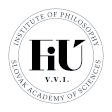Contact
Institute of Philosophy SAS, v.v.i.
Klemensova 19
811 09 Bratislava 1
Slovak Republic
Tel.: +4212 5292 1215
E-mail: sekretariat.fiu@savba.sk
Home page
Address for correspondence:
Filozofický ústav SAV, v. v. i.
P. O. Box 3364
813 64 Bratislava
Slovak Republic
Journal Filozofia
Institute of Philosophy SAS, v.v.i.
Filozofia Editorial Office
Klemensova 19
811 09 Bratislava 1
Slovak Republic
Tel.: +4212 5292 1215
E-mail: redakcia.filozofia@savba.sk
Home page
Address for correspondence:
Filozofický ústav SAV, v. v. i.
Filozofia Editorial Office
P. O. Box 3364
813 64 Bratislava
Slovak Republic
Journal Organon F
Institute of Philosophy SAS, v.v.i.
Organon F Editorial Office
Klemensova 19
811 09 Bratislava 1
Slovak Republic
Tel.: +4212 5292 1215
E-mail: organonf@gmail.com
Home page
Address for correspondence:
Filozofický ústav SAV, v. v. i.
Organon F Editorial Office
P. O. Box 3364
813 64 Bratislava
Slovak Republic
